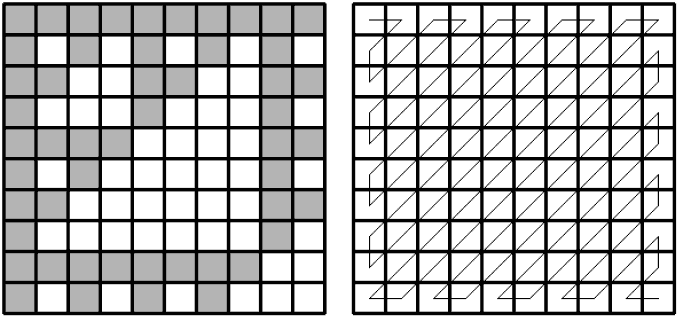COCI 2008/2009, Contest #1
Task JEZ
Luka found a very unusual game board in his attic. Surprisingly, it consists of R·C square cells. The rows are numbered 0 to R-1 top to bottom and the columns 0 to C-1 left to right.
What makes the board unusual is the way in which the cells are coloured. Each cell is either grey or white:
- white, if the row and column numbers of the cell, when represented in binary, have at least one digit 1 in the same position. For example, the cell (4, 5) would be white.
- grey, otherwise. For example, the cell (2, 5) would be grey.

Luka's hedgehog likes walking on this unusual board and does it in an unusual way. The hedgehog starts his walk in the cell (0, 0) and continues in the zig-zag pattern as in the second image above. While the hedgehog is walking, Luka counts how many grey squares it visited.
After visiting K squares, the hedgehog gets tired and falls asleep. Luka then goes to bed too, happy that he was able count the grey squares.
Knowing the dimensions of the board and the number K beforehand, however, it is possible to write a program that calculates the result faster. This is your task.
Input
The first line contains two integers R (1 ≤ R ≤ 1,000,000) and C (1 ≤ C ≤ 1,000,000), the dimensions of the board.
The second line contains the integer K (1 ≤ K ≤ R·C), the total number of squares the hedgehog visits. Note that this number may not fit in a 32-bit integer.
Output
Output the number of grey cells the hedgehog visits.Scoring
In test cases worth 50% of points, K will be less than 1,000,000.Examples
Input10 10 6 Output5 |
Input3 5 11 Output8 |
Input10 10 100 Output51 |
All Submissions
Best Solutions
Point Value: 20 (partial)
Time Limit: 1.00s
Memory Limit: 32M
Added: Oct 18, 2008
Languages Allowed:
C++03, PAS, C, HASK, ASM, RUBY, PYTH2, JAVA, PHP, SCM, CAML, PERL, C#, C++11, PYTH3










Comments (Search)
but: